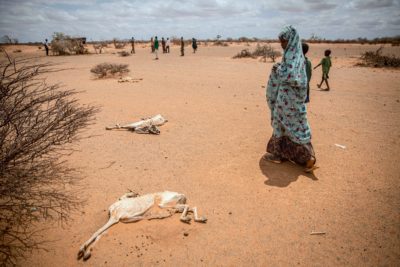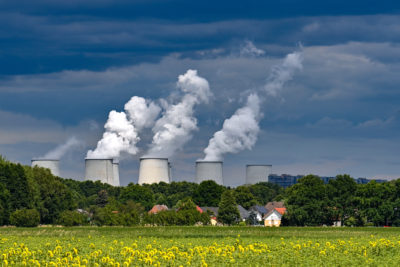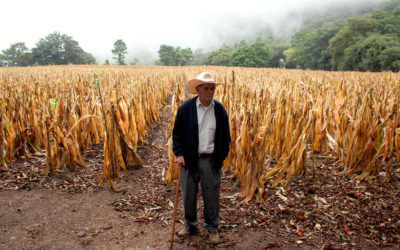Because the floodwaters retreated from an estimated one-third of his nation in September, Pakistan’s Prime Minister Shehbaz Sharif was very clear. His closely indebted nation shouldn’t be pressured to take a “begging bowl” to wealthy nations, asking them to assist restore his nation after its worst-ever monsoon floods — not when all of the proof instructed that the reason for the floods lay with the local weather change attributable to these nations’ air pollution.
“The enormity of this climate-induced disaster is past our fiscal means,” he mentioned. “That is about local weather justice.”
On the subsequent worldwide local weather negotiations, in Egypt’s Sharm el-Sheikh beginning November 6, the place he might be co-chair, Sharif is anticipated to push for reparations for the “loss and injury” being inflicted by local weather change on poor nations similar to his.
He’ll hardly be alone on the convention of events to the UN local weather conference, COP27. Many creating nations are anticipated to hitch him in making the decision for a brand new worldwide “finance facility” to channel what some name local weather reparations for the “loss and injury” they’ve suffered. Many analysts say the success or failure of the convention is prone to rely on how wealthy nations reply.
With out progress on ‘loss and injury,’ one analyst says, the local weather talks “might derail proper from the beginning.”
Local weather change is turning into more and more lethal and disruptive. This 12 months’s mega-flood in Pakistan, together with a drought in Somalia that’s excessive even by the requirements of East Africa, and unprecedented warmth waves throughout India, Europe, and China, present starkly how ever extra excessive climate is creating chaos far past the variation capabilities of people, communities, or nations.
The blame for that is clear. The nice majority of the carbon dioxide within the environment that’s inflicting the disruption has come from a handful of earlier industrializers, headed by the USA, which have been pumping the greenhouse gasoline into the air for a century and extra.
Now, these on the receiving finish — the poorest nations, who’re typically least accountable for local weather change and have infrastructures and economies least capable of adapt — need compensation. However wealthy nations — particularly U.S. administrations of all political stripes — have lengthy refused to concede they need to present this. They’re dedicated to serving to poor nations cut back their emissions and to put money into methods of adapting to local weather change; however they are saying paying compensation is a step too far.
Analysts say the difficulty is prone to come to a head at first of the upcoming COP27 assembly in Egypt. The creating nations grouping generally known as G77 and China, presently chaired by Pakistan, says it’ll insist on the opening day {that a} new merchandise is added to the convention agenda — to create a finance facility to compensate nations for loss and injury.
A toddler displaced by drought walks previous a goat carcass close to Dollow, Somalia on April 14, 2022.
Sally Hayden / SOPA Photos by way of ZUMA Press Wire
The U.S., the European Union, and others that must pay into this fund should determine whether or not to drop their veto and conform to the concept. It’s “the primary litmus take a look at for fulfillment as COP27,” says Preety Bhandari, of the worldwide local weather program on the World Sources Institute (WRI), a Washington-based assume tank. With out progress, he says, proceedings “might derail proper from the beginning.”
COP27 will start with low expectations. The Egyptian hosts say negotiators should transfer “from pledges to implementation.” It’s a tacit admission that many of the guarantees made finally 12 months’s occasion, hosted by Britain in Glasgow, stay unmet. Analysts recommend the world continues to be on target for at the very least 2.4 levels C (4.3 levels F) of warming. And politicians’ minds are on different issues.
In Europe, due to Russia’s invasion of Ukraine, the change to renewable vitality is on maintain. Governments are as a substitute searching for out new sources of fossil fuels to switch gasoline provides misplaced from Russia. Germany, as soon as a trailblazer in adopting renewable vitality, is considered one of a number of European nations which might be reopening coal-fired energy vegetation. In the meantime Britain, which continues to chair world local weather negotiations till COP27 opens, is in monetary and political meltdown, with new Prime Minister Liz Truss awarding licences to take advantage of hydrocarbons beneath the North Sea, promising to renew fracking on land, and even reportedly vetoing King Charles’s plan to attend COP27.
“Meals and vitality insecurity and dramatic value rises have … pushed local weather change down home political agendas.”
Extra extensively, says Ruth Townend, local weather threat fellow at Chatham Home, a London-based assume tank, “meals and vitality insecurity and dramatic value rises have … pushed local weather change down home political agendas the world over.”
The commitments made in Glasgow are principally languishing. All nations pledged to “revisit and strengthen” their 2030 emissions targets by the top of 2022 so as to higher align them with the objectives of the 2015 Paris Settlement to restrict warming to shut to 1.5 levels C. However by mid-October, solely 24 principally small nations had submitted new targets. Of industrialized nations, solely Australia, beneath a brand new authorities, has considerably upped its commitments, analysts say.
In the meantime, the numerous nationwide pledges that made headlines in Glasgow — on restoring forests, reducing methane emissions, phasing out coal, decarbonizing delivery, and extra — have had few tangible outcomes. For example, solely 15 of the 119 nations that signed the pledge on methane have but produced quantified discount targets, in keeping with WRI. There isn’t even settlement on how most of the pledges might be audited or measured.
China pulled the plug on the high-profile U.S.-China deal for cooperation on methane emissions reductions after Nancy Pelosi’s go to to Taiwan angered Chinese language officers. And, regardless of many monetary establishments signing up in Glasgow to make their companies compliant with net-zero emissions by 2050, World Financial institution President David Malpass, a Donald Trump appointee, has been referred to as out in latest weeks for showing to query whether or not local weather change is actual in any respect.
The Jänschwalde coal energy plant in Germany, which is reopening coal-fired mills to deal with cuts to Russian gasoline.
Patrick Pleul / Image Alliance by way of Getty Photos
“COP27 might be an vital second for assessing progress on such offers,” Townend says of the Glasgow pledges. However now local weather diplomats face a extra near-term menace that might upend additional progress — the rising calls for of creating nations for money compensation for the loss and injury to them attributable to the emissions of developed nations.
Local weather negotiators have debated requires such compensation for a few years. The time period “loss and injury” first appeared in negotiated textual content at COP13 in Bali in 2007. The phrase covers each direct injury from excessive climate and rising sea ranges, and potential financial loss from not with the ability to exploit reserves of fossil fuels in the way in which developed nations did up to now.
In Might, Egypt’s finance minister Mohamed Maait gave The Guardian an instance of the latter. Senegal in West Africa had just lately begun creating main pure gasoline reserves. “Senegal [was] hoping this discovery would assist them. Now you’re coming to say, local weather change means stopping the finance,” mentioned Maait. With out compensation, nations similar to Senegal would really feel they’re being punished for the actions of others, he mentioned.
Compensation for loss and injury is seen as a crucial third pillar in local weather finance for poor nations — to face alongside funding in renewable vitality and funding to assist them adapt to local weather change.
The U.S. and EU concern that such compensation may expose them to authorized problem for his or her culpability for local weather change.
However whereas the opposite two pillars have acquired funding, albeit fitfully and inadequately, progress on loss and injury has been blocked by the U.S. and, to a lesser extent, the EU. They each concern it would open them as much as authorized problem for his or her culpability for local weather change.
As a part of the Paris Settlement, the U.S. and EU did concede for the primary time that finance for loss and injury is perhaps wanted. However they inserted textual content saying this might not present the idea for authorized legal responsibility for compensation claims. In Glasgow, they vetoed calls for for a finance facility however agreed to the institution of a three-year “dialogue” on the matter.
Within the wake of escalating local weather disasters similar to occurred in Pakistan, and with one examine estimating that the price of loss and injury might exceed a trillion {dollars} per 12 months by 2050, poor nations say their calls for can’t wait. Humanitarian help will not be sufficient. They need recognition of their proper to compensation.
“The local weather disaster has pushed our adaptation limits, resulted in inevitable loss and injury, and delayed our much-needed growth,” Senegal’s senior local weather official Madeleine Diouf Sarr, who chairs the Least Developed International locations Group of 46 nations in local weather negotiations, advised the Related Press this month. “We will now not afford to have a COP that’s all discuss.”
A farmer stands in entrance of a desiccated corn area in San Jose del Golfo, Guatemala. Central America has been bothered by extreme drought since 2014.
Luis Echeverria / Xinhua / Alamy Stay Information
U.S. presidential local weather envoy John Kerry continues to push again in opposition to the concept of a separate pot of cash to compensate for the impacts of local weather change. However some wealthy nations are shifting floor. Within the wake of the Pakistan floods, Denmark grew to become the primary nation to supply particular loss-and-damage funding — albeit simply $13.1 million. German overseas affairs minister Annalena Baerbock mentioned her authorities backed placing the difficulty on the agenda for COP27, and in collaboration with Egypt as convention host, appointed its local weather envoy, former Greenpeace Worldwide govt director Jennifer Morgan, and Chile’s atmosphere minister Maisa Rojas to attempt to discover frequent floor. If the 2 fail in that job, then the disagreement might be a diplomatic bomb bursting over subsequent month’s talks.
The row might scupper the convention altogether, analysts warn, with walkouts and boycotts. However even when that doesn’t occur, it might badly injury the belief crucial for the convention’s different work. “The politics of loss-and-damage compensation might stall and overshadow negotiations on mitigating and adapting to local weather change,” says Melanie Capsule, a local weather coverage analyst on the Australian Nationwide College.
The rising anger amongst poor nations over compensation is partly the results of the failure of wealthy nations to ship on guarantees first made 13 years in the past to search out $100 billion yearly to assist creating nations minimize their emissions and adapt to altering local weather.
A latest examine discovered that Africa was receiving simply 11 p.c of the cash it wanted for adaptation.
It’s true that funding is rising. The U.S., with European authorities companions, is brokering finance to steer some main creating nations in direction of low-carbon growth. An $8.5 billion plan for South Africa, introduced in Glasgow, might quickly get off the bottom, after the South African authorities submitted formal plans to donors this month. It ought to be adopted by comparable plans for India, Indonesia, Vietnam, and Senegal. China, in the meantime, this month arrange what might be a rival “world clear vitality partnership” that analysts anticipate will search developing-world companions at COP27.
However the $100 billion annual goal has but to be met. And whereas buyers are eager to fund clean-energy funding, guarantees of an equal dedication to serving to nations adapt to local weather change stay unfulfilled. A examine printed in September by the Local weather Coverage Initiative, a California-based local weather finance assume tank, discovered that Africa was receiving simply 11 p.c of the cash it wanted for adaptation.
It’s also ever clearer that no quantity of adaptation finance can maintain again the avalanches of maximum climate plaguing the world. It’s a Band-Assist within the face of life-threatening trauma. Thirty-three million Pakistanis “are paying within the type of their lives and livelihoods for the industrialization of larger nations,” Pakistan’s overseas minister Bilawal Bhutto-Zardari mentioned on the UN Common Meeting in September. It’s a cost of culpability that has but to obtain a convincing response.



